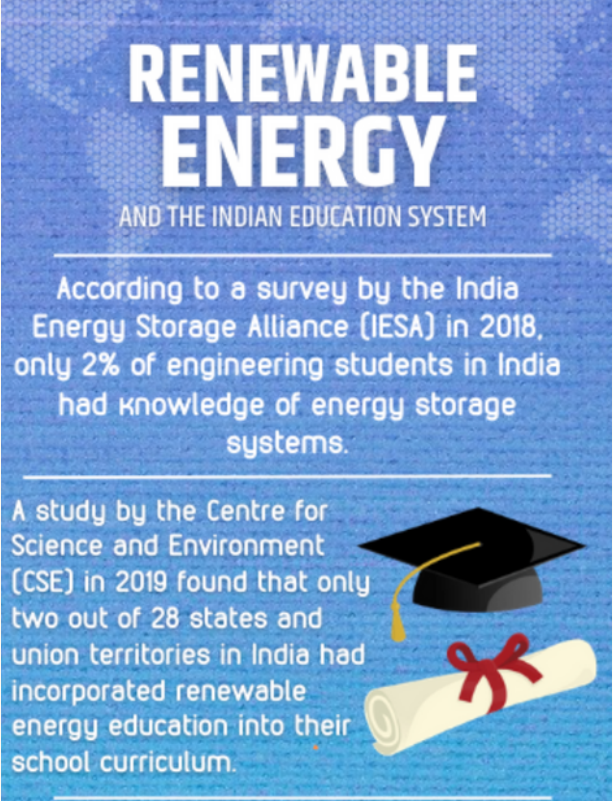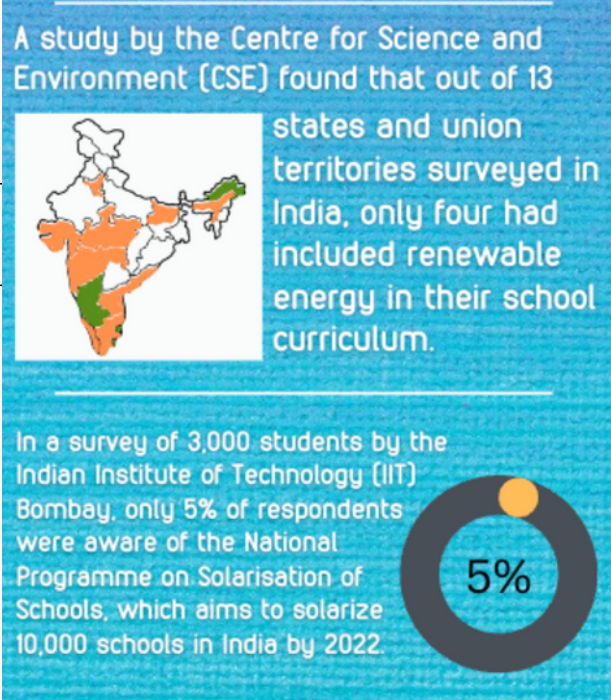Renewable Energy in Classrooms and Curriculums
- Nishtha Sehgal

- May 26, 2023
- 3 min read
Electrical bulbs, automobiles, air conditioners, microwaves, chullahs, and machines –the term ‘energy’ conjures up the pictures of practically everything that makes up our daily lives. Today, 77% of India’s total energy comes from fossil fuels. It's our primary source for all energy related goods and services, they are raw materials used for diesel, gas, oil, and petroleum. The problem is that every stage of mining and using fossil fuels adds to climate change.
Global warming has kept us on our toes since the last decade. And if we do not redirect energy requirements to renewable energy soon, the predicted future will be lived by our children today. This involves catastrophic heatwaves, rising sea levels, droughts, hurricanes, and other concerning (and rapid) changes. Therefore, children (the current generation) need to learn about renewable energy practices, so as to potentially salvage their futures. It’s a fundamental component in their lives and hence they should be encouraged to engage with it at an academic level.
The lack of awareness on renewable energy amongst student communities (even from privileged backgrounds) is truly astonishing, following is some data to support the same.


Renewable energy is a broad subject which spans over various science and engineering topics in classroom. Oftentimes, schools have limited flexibility in their curriculums due to government regulations or standardized testing requirements. Many schools in underprivileged are lack resources such as funding and equipment to include renewable energy in their curriculum. However, there are ways to work around these constraints:
Renewable energy is a very practical subject, schools can organize field trips to solar power plants or wind power plants to give them a hands on learning experience and also inspire and interest.
Connect with renewable energy organizations: Partner with local renewable energy organizations to provide training, resources, and support for teachers and students.
Integrate renewable energy into existing curriculum: Integrate renewable energy into existing science, technology, engineering, and math (STEM) classes, as well as environmental studies and social studies classes.
In my school, Shiv Nadar School, we’ve recently initiated a student-led renewable energy project where we aim to fulfil the energy requirements of any classroom in the campus with a renewable source that we engineered from scratch. We call this initiative Project Urja. Every aspect of the project – from project ideation, to social media management is carried out by the students. Our aim for this project is to create a meaningful impact on the environment and inspire others to do the same. We may not be having a very significant impact on the environment, but in our fight against the climate change, even the smallest most insignificant steps count. And I believe that schools are an excellent place to start the journey.
Renewable is now, gradually playing and increasingly important role in our education systems. The Ministry of New and Renewable Energy has also launched several initiatives to promote renewable energy education in India. For example, the ministry has set up a Renewable Energy Education and Training (REET) programme to train students, teachers, and professionals in renewable energy technologies.
Many educational institutions in India are also taking steps to promote renewable energy.
For instance, the Indian Institute of Technology (IIT) Bombay has set up a Solar Urja Lamp (SoUL) programme to provide solar lamps to rural households. Similarly, the TERI School of Advanced Studies in Delhi offers a postgraduate programme in Renewable Energy Engineering and Management.
Energy is a very dynamic field and has a very direct impact on our lives, in both, positive and negative ways. While it illuminates and enhances our lives, it can also harm our planet and future. Furthermore, a significant portion of the world's population still lacks access to affordable and modern energy.
Due to these reasons, the United Nations has included renewable energy as a crucial component of its Sustainable Development Goals. SDG #7, which focuses on affordable and clean energy, plays a crucial role in modern education. It emphasizes the impact of renewable energy on a global scale and encourages students to view energy-related challenges and issues from fresh perspectives.
Written by Nishtha Sehgal

This data-driven article has been written by a student journalist as part of the April'23 cohort of the Re-Imagining Media Program.





Comentários